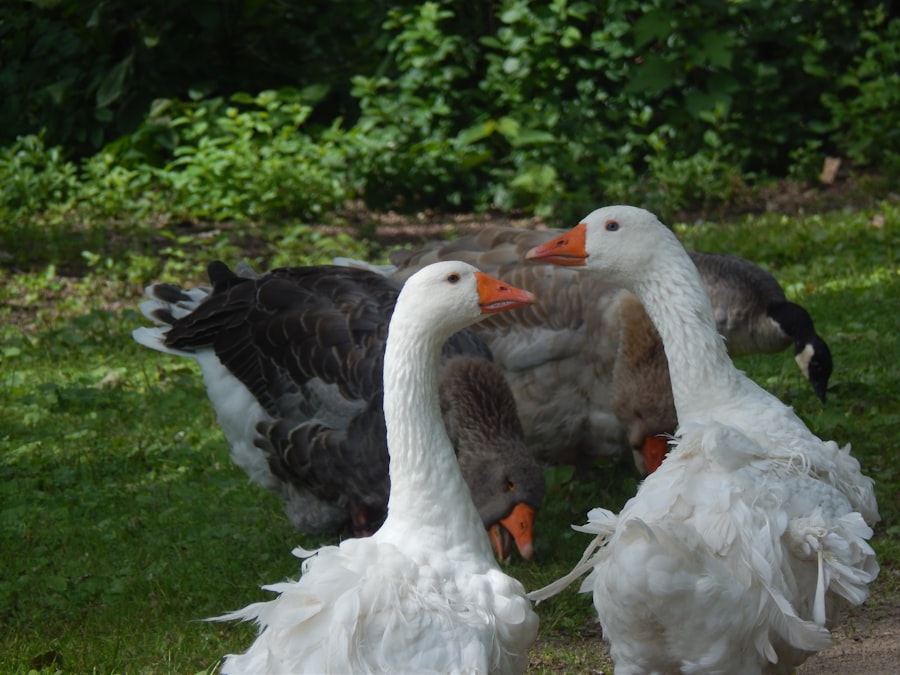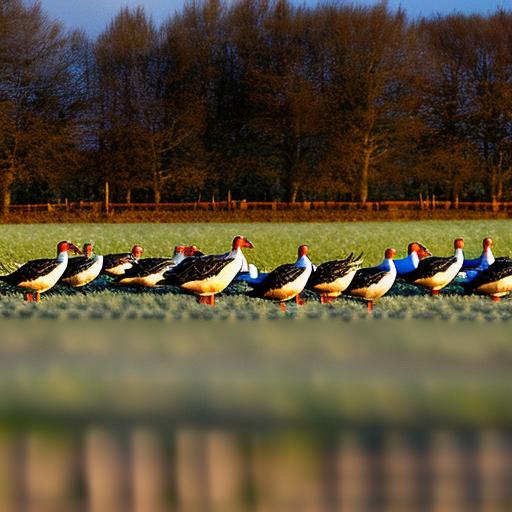Keeping geese on the farm can offer a range of benefits for farmers. Geese are known for their excellent foraging abilities, which can help control weeds and pests in the fields. They also produce high-quality meat and eggs, making them a valuable addition to any farm. In addition, geese are hardy and adaptable animals that can thrive in various climates.
However, before getting geese, there are several considerations to keep in mind. Geese require adequate space to roam and graze, so farmers should have enough land to accommodate their needs. They also need access to water for swimming and bathing, as well as shelter to protect them from extreme weather conditions. Additionally, geese can be noisy and territorial, so farmers should consider the impact on their neighbors and other livestock.
Key Takeaways
- Keeping geese on the farm can provide benefits such as pest control, fertilizer production, and meat and egg production.
- When choosing a breed of geese, consider factors such as temperament, size, and egg or meat production.
- Geese require adequate housing and shelter, including protection from predators and access to water for swimming.
- A balanced diet for geese includes grains, greens, and protein sources, with feed amounts varying based on age and activity level.
- Regular health checks and disease prevention measures, such as vaccination and biosecurity, are important for maintaining a healthy flock.
Choosing the right breed of geese for your farm
There are several popular breeds of geese that farmers can choose from, each with its own unique characteristics. Some common breeds include Toulouse, Embden, and Chinese geese.
Toulouse geese are known for their large size and excellent meat production. They have a calm temperament and are easy to handle, making them a popular choice for small-scale farmers. Embden geese are also large in size and are primarily raised for meat production. They have a white plumage and a docile nature.
Chinese geese, on the other hand, are smaller in size but are known for their excellent egg-laying abilities. They have a distinctive knob on their beak and are highly adaptable to different climates. Chinese geese are also known for their loud honking, which can serve as an effective deterrent against predators.
When choosing a breed of geese for your farm, it is important to consider factors such as climate, available space, and intended purpose (meat production or egg-laying). It is also advisable to source geese from reputable breeders to ensure the health and quality of the birds.
Housing and shelter requirements for geese on the farm
Geese require adequate housing and shelter to protect them from extreme weather conditions and predators. There are several types of housing options for geese, including simple shelters, barns, and fenced-in areas.
Simple shelters can be constructed using basic materials such as wood and wire mesh. These shelters should provide enough space for the geese to move around comfortably and should have a roof to protect them from rain and snow. It is also important to provide adequate ventilation to prevent the buildup of moisture and ammonia.
Barns are another option for housing geese, especially in colder climates. Barns provide additional protection from the elements and can be insulated to keep the geese warm during winter months. They should have proper lighting and ventilation to maintain a healthy environment for the birds.
Fenced-in areas are ideal for geese that have access to a large pasture or field. The fence should be tall enough to prevent predators from entering and should be buried at least a foot into the ground to prevent digging. It is also important to provide access to water for swimming and bathing.
When building a shelter for geese, it is important to consider their natural behaviors and needs. Geese are social animals that prefer to be in groups, so it is advisable to provide enough space for them to interact with each other. Additionally, providing nesting boxes or areas for egg-laying can help encourage natural behaviors.
Feeding and nutrition for geese: what to feed and how much
Geese have specific dietary needs that must be met in order for them to thrive. They require a balanced diet that includes a combination of grains, greens, and protein sources.
Grains such as corn, wheat, and barley are staple foods for geese and should make up the majority of their diet. These grains can be fed in whole form or ground into a mash. It is important to provide a consistent source of grains to ensure the geese receive enough energy for growth and maintenance.
In addition to grains, geese also require access to fresh greens and vegetables. This can include grass, clover, lettuce, and other leafy greens. Greens provide essential vitamins and minerals that are necessary for the geese’s overall health.
Protein is also an important component of a goose’s diet, especially during periods of growth or egg-laying. Protein sources can include soybean meal, fish meal, or other animal-based protein supplements. It is important to provide a balanced amount of protein to prevent deficiencies or excesses.
The amount of food to feed geese will depend on their age, size, and activity level. As a general guideline, adult geese should be fed approximately 1/4 to 1/2 pound of feed per day. This can be adjusted based on their individual needs and condition.
It is important to provide fresh, clean water at all times for geese. They require water for drinking, bathing, and swimming. Water should be changed regularly to prevent contamination and should be provided in a shallow container that allows the geese to dip their heads and clean their feathers.
Health and disease management for geese on the farm
Like any livestock, geese are susceptible to various health issues and diseases. It is important for farmers to be aware of common health problems and take preventive measures to ensure the well-being of their flock.
Some common health issues for geese include respiratory infections, parasites (such as worms and mites), and foot problems. Respiratory infections can be caused by poor ventilation or exposure to damp conditions. Regular cleaning of the shelter and providing adequate ventilation can help prevent respiratory issues.
Parasites can be controlled through regular deworming and the use of appropriate insecticides. Farmers should also regularly inspect their geese for signs of mites or lice and take appropriate measures to treat infestations.
Foot problems can occur if geese are kept on hard or uneven surfaces for extended periods of time. Providing a soft bedding material, such as straw or wood shavings, can help prevent foot problems. Regular trimming of nails and monitoring for signs of infection or injury is also important.
In addition to preventive measures, farmers should have a plan in place for treating sick or injured geese. This may involve consulting with a veterinarian or seeking advice from experienced farmers. It is important to isolate sick birds to prevent the spread of disease and provide appropriate treatment.
Breeding and hatching goslings on the farm

Breeding geese can be a rewarding experience for farmers, as it allows them to expand their flock and potentially increase their production of meat or eggs. Geese have a natural breeding season that typically occurs in the spring.
During the breeding season, male geese (known as ganders) will display courtship behaviors such as honking, flapping their wings, and chasing females. Female geese (known as geese) will lay eggs in nests that they build on the ground or in elevated areas.
To encourage successful breeding, it is important to provide suitable nesting areas for the geese. This can include providing nesting boxes or areas with soft bedding material. It is also important to provide privacy and minimize disturbances during the breeding season.
Once the eggs are laid, they will typically be incubated by the female goose for approximately 28-30 days. However, some farmers may choose to use artificial incubators to hatch the eggs. It is important to monitor the temperature and humidity levels during incubation to ensure successful hatching.
After hatching, goslings should be kept in a warm and secure environment until they are strong enough to join the rest of the flock. They should be provided with a balanced diet and access to water for swimming and bathing.
Managing geese for egg production and meat harvesting
Geese can be managed for both egg production and meat harvesting, depending on the goals of the farmer. For egg production, it is important to select breeds that are known for their excellent egg-laying abilities, such as Chinese geese.
To encourage egg production, it is important to provide suitable nesting areas and a balanced diet that includes adequate protein and calcium. Geese should also have access to fresh water at all times.
For meat harvesting, geese should be raised to a suitable age and weight before processing. This can vary depending on the breed and market demand. It is important to provide a balanced diet that promotes healthy growth and development.
When harvesting geese for meat, it is important to follow proper processing techniques to ensure food safety. This may involve bleeding, scalding, plucking, and eviscerating the birds. It is advisable to seek guidance from experienced farmers or professionals when first starting out.
Training geese for herding and other farm tasks
Geese can be trained to perform various farm tasks, including herding other livestock or acting as guard animals. Training geese for herding can be beneficial for farmers who have other animals that need to be moved or managed.
Geese are naturally territorial animals and will instinctively protect their territory from intruders. This can make them effective guard animals, especially against smaller predators such as foxes or raccoons.
To train geese for herding or guarding, it is important to start with young birds that are socialized and comfortable around humans. Positive reinforcement techniques, such as treats or praise, can be used to encourage desired behaviors.
It is also important to provide appropriate training areas and gradually introduce the geese to the tasks at hand. Consistency and patience are key when training geese, as they may take time to learn and adapt to new tasks.
Geese and predator control: keeping your flock safe
Geese are natural guardians and can help protect the flock from predators. However, they are also vulnerable to certain predators and it is important for farmers to take appropriate measures to keep their geese safe.
Common predators for geese include foxes, raccoons, coyotes, and birds of prey. It is important to provide secure fencing or enclosures to prevent predators from entering the geese’s living area. Fences should be tall enough to prevent climbing or jumping and should be buried at least a foot into the ground to prevent digging.
Farmers can also use deterrents such as noise-making devices or motion-activated lights to scare away predators. It is important to regularly inspect the fencing and enclosures for any signs of damage or weakness.
In addition to physical barriers, farmers can also use guardian animals such as dogs or llamas to help protect the geese from predators. These animals can act as a deterrent and provide an additional layer of security.
Marketing and selling goose products from your farm
There is a growing demand for high-quality goose products, including meat, eggs, feathers, and down. Farmers can take advantage of this market by marketing and selling their goose products directly from their farm.
Popular goose products to sell include whole geese for meat, goose eggs for consumption or hatching, feathers for crafts or decorations, and down for pillows or bedding. It is important to ensure that the products meet all food safety regulations and are of high quality.
To market goose products, farmers can utilize various channels such as farmers markets, online platforms, or direct sales to restaurants or specialty stores. It is important to develop a strong brand identity and communicate the unique qualities of the products.
Farmers can also consider value-added products such as goose sausages or pates, which can attract a wider range of customers. It is important to invest in proper packaging and labeling to ensure the products are attractive and comply with all regulations.
In conclusion, keeping geese on the farm can offer a range of benefits for farmers, including weed and pest control, high-quality meat and eggs, and adaptability to various climates. However, there are several considerations to keep in mind before getting geese, such as space requirements and potential noise issues. Choosing the right breed of geese is also important, as different breeds have different characteristics and purposes. Providing adequate housing and shelter, as well as a balanced diet, is essential for the health and well-being of geese. Farmers should also be aware of common health issues and take preventive measures to ensure the flock’s health. Breeding and hatching goslings can be a rewarding experience, and geese can be managed for both egg production and meat harvesting. Training geese for herding or other farm tasks can be beneficial, as they are naturally territorial animals. Farmers should also take appropriate measures to protect their geese from predators and market their goose products effectively.
If you’re interested in keeping geese on your farm, you may also want to check out this informative article on the Poultry Wizard website about the importance of the floor in a chicken coop. Having a well-designed and properly maintained floor is crucial for the health and well-being of your poultry. To learn more about this topic, click here.
FAQs
What are geese?
Geese are waterfowl birds that are commonly found in many parts of the world. They are known for their long necks, webbed feet, and distinctive honking sound.
Why keep geese on the farm?
Geese can be kept on the farm for a variety of reasons, including as a source of meat, eggs, feathers, and down. They can also be used for weed control and as guard animals.
What do geese eat?
Geese are omnivores and will eat a variety of foods, including grass, grains, insects, and small animals. They should be provided with a balanced diet that includes both commercial feed and fresh water.
How do you care for geese?
Geese require regular care, including feeding, watering, and cleaning their living area. They should also be provided with adequate shelter and protection from predators. Regular health checks and vaccinations may also be necessary.
What are some common health issues for geese?
Geese can be susceptible to a variety of health issues, including respiratory infections, parasites, and injuries. Regular health checks and vaccinations can help prevent these issues.
Can geese be aggressive?
Geese can be territorial and may become aggressive if they feel threatened or if their nesting area is disturbed. It is important to handle geese with care and to provide them with adequate space and protection.
What are some tips for raising geese?
Some tips for raising geese include providing them with a balanced diet, adequate shelter, and protection from predators. It is also important to handle them with care and to monitor their health regularly.
Meet Walter, the feathered-friend fanatic of Florida! Nestled in the sunshine state, Walter struts through life with his feathered companions, clucking his way to happiness. With a coop that’s fancier than a five-star hotel, he’s the Don Juan of the chicken world. When he’s not teaching his hens to do the cha-cha, you’ll find him in a heated debate with his prized rooster, Sir Clucks-a-Lot. Walter’s poultry passion is no yolk; he’s the sunny-side-up guy you never knew you needed in your flock of friends!







